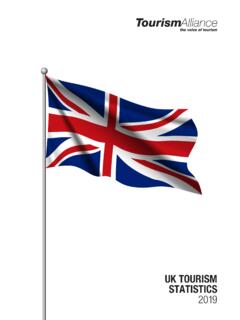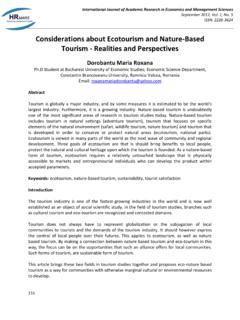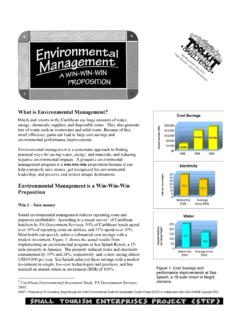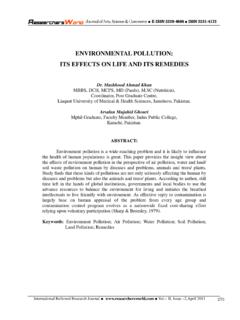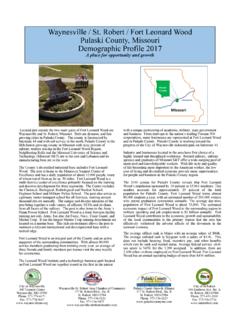Transcription of TOURISM AFTER BREXIT 2017 - Tourism Alliance
1 A Post- BREXIT Policy Agenda for the UK TOURISM IndustryTOURISM AFTER BREXIT 201 7 TOURISM and the UK EconomyTourism is one of the UK s largest and most successful industries. It is the fifth largest in terms international visitor expenditure, the eighth largest by visitor numbers and is ranked fifth in the world in terms of international competitiveness. The sectors that comprise the UK TOURISM industry together generate 130bn in revenue for the UK economy, 25bn in export earnings and employ is one of the UK s largest and most successful industries. The UK TOURISM Industry is: 206,000 of UK of UK Exports9% of UK GDPUK s fifth largest export industry in VAT and APD paymentsOver 50,000 employees in every regionSector Revenue to the UK economyInbound airlines 130bnIn 2017 , the UK TOURISM Industry will: Grow by up to 8%Generate a further for the UK economyCreate 100,000 additional jobsSince 2009, the UK TOURISM Industry has:Grown at a faster rate than most other industriesGenerated additional employment at almost twice the rate of other industriesIncreased export earnings by Post BrexitTourism has been one of the UK s most successful industries over the past decade and, given the right policy structure, will continue to grow strongly in a Post- BREXIT environment.
2 Regardless of being outside the EU, the UK will continue to be one of the world s most desirable and visited destinations and our citizens will continue to travel to the EU and Anholt s annual survey of 20,000 consumers in 20 panel countries around the world indicates that the views of potential overseas visitors to the UK have changed little AFTER the referendum. The study, which ranks 50 countries, shows that UK s overall brand ranking is third behind Germany and the USA, while in terms of TOURISM , the UK is the 5th most popular the outcome of BREXIT negotiations cannot be predicted, this document is based on two basic assumptions: That agreements facilitating travel between the UK and other EU countries are largely maintained The UK and EU TOURISM industries are highly interdependent with (76%) of trips by UK residents to other EU destinations and 23m (67%) of visitors to the UK coming from other EU destinations.
3 Visitors from the EU contribute around 10bn to the UK economy each year while outbound TOURISM to the EU contributes an estimated 19bn to the UK economy. One of the main reasons for this high level of interdependence is the harmonised Single Market. This framework of agreements, rules and regulations has encouraged TOURISM flows between the UK and the rest of Europe, allowing the UK TOURISM industry to grow to become one of the largest in the world and a key component of the UK economy. It is essential to the future UK TOURISM industry that such an environment is maintained. That EU nationals currently living in the UK are allowed to remain when the free movement of workers from the EU ends Figures from People 1st, the former skills sector council for the TOURISM sector, show that, while EU nationals comprise only 11% of the overall TOURISM workforce, as the UK unemployment rate has fallen, businesses have become increasing reliant on EU nations to fill vacancies.
4 This problem is exacerbated in regions such as London and in individual businesses that have very high levels of EU workers. To ensure the TOURISM industry has a smooth transition to a post- BREXIT environment, these valued workers need to be allowed to is also presumed that the Government s new TOURISM Action Plan, launched by the Prime Minister in August 2016 will continue to be the key TOURISM policy document. The goal of this plan is to grow and spread the benefits of TOURISM to the regions through the five key strands of: Structure Skills Deregulation Transport WelcomeAs such, this document identifies the core policies that the Government needs to adopt to take forward each strand of the Government TOURISM Action Plan in a Post- BREXIT for TourismTourism has been one of the UK s largest and most successful industries over the last decade.
5 With the UK exiting the European Union and re-orientating towards the rest of the world, it is important that the ongoing performance of the industry is maintained and TourismInbound TOURISM to the UK generates 25bn per annum for the UK economy, marking it the second largest source of export earnings in the Service Sector AFTER Financial Services and the UK s fifth largest export earner overall behind Chemicals, Intermediate Manufactured Goods, Financial Services and Capital United Nations World TOURISM Organisation (UNWTO) predicts that international TOURISM will continue to grow at a compound rate of per annum with international tourist arrivals reaching billion by 2030. The UK should target growth of at least this level so that, by 2025, TOURISM receipts reach 32bn per annum and by 2030 they reach 39bn per UK should also seek to regain the market share of the BRIC markets that it had in 2008 before the introduction of biometric visas.
6 Achieving this goal would increase inbound revenue to the UK by a further per annum and ensure that the UK is a major destination for the world s major growth addition, the Government needs to set ambitious target for the growth international TOURISM to the regions and support the regions in achieving these TourismThe domestic TOURISM industry in England generates 66bn per annum and employs over people. Domestic TOURISM growth has traditionally been slower than inbound TOURISM growth due to the maturity of the market and that UK population growth is slower than the global average. Nevertheless, between 2010 and 2015, overnight domestic TOURISM increased by 5% per annum and day-visits increased by 3% per annum. As such, a domestic TOURISM growth rate of 4% per annum should be feasible, although it cannot be assumed and requires policies that support investment and infrastructureOutbound TourismThe UK outbound TOURISM industry is one of the largest in the world.
7 As well as directly contributing over 26bn per annum to the UK economy and providing employment for over 400,000 people in the UK, it s success is vital to maintaining the UK s position as one of the world s key hubs for international travel and to expanding the UK s international transport network which, in turn, facilitates trade. The goal should therefore be to grow outbound TOURISM at the same rate as rest of the UK TOURISM CompetitivenessThe World Economic Forum undertakes a biennial assessment of the international competitiveness of the TOURISM industry in 141 countries around the world. In 2015, the UK ranked as having the 5th most competitive TOURISM industry in the world (behind Spain, France, Germany and the USA) having risen from 7th position in leaving the EU and seeking to develop closer connections with other markets, it is important that the UK s competitive position is enhance.
8 As such, the goal should be to further increase the UK s international competitiveness ranking to that regard, there should be four overall goals for the performance of the UK TOURISM industry in a post BREXIT Sustainable Destination Management Organisations (DMOs)Incorporating TOURISM into a Replacement Scheme for CAPD omestic TOURISM comprises over 60% of total TOURISM revenue and, outside Government expenditure, represents the most important mechanism for redistributing economic activity and wealth from urban to rural and seaside areas in the UK. If Government is to achieve the goal of spreading the benefits of TOURISM to the regions, then DMOs must have a viable mechanism for accessing the long-term sustainable funding required to develop and promote the high quality world-class products needed to attract addition, for VisitBritain to be able to maximise inbound TOURISM from overseas markets, it needs to have strong, viable DMO partners to engage and work with in order to develop the product needed.
9 Yet, since 2008, public funding for domestic TOURISM has decreased from 197m to just 71m due to the abolition of the RDAs, the reduction in Council funding and the merger of VisitEngland into VisitBritain. Hopes that the industry would step in and replace the reduction in public funding have proved wrong due to the free-rider effect and, due to DMOs neither having a statutory remit nor access to stable funding, has led to fragmentation and revenue fundamental problem is that there is no linkage between the 128bn spend in the UK by tourists each year and the DMOs designated to promotion and develop TOURISM . If the UK is to maximise the growth of TOURISM in a post- BREXIT environment, then the Government needs to ensure that there is a functioning network of DMOs able to engage and work in partnership with VisitBritain and the Government on the implementation of the TOURISM Action is therefore proposed that a Government-sponsored taskforce is established to determine an appropriate fiscal mechanism for enabling DMOs to gain the resources required to play their role in the implementation of the TOURISM Action 365m trips made to rural destinations each year generate for the rural economy which, in turn, provides over 340,000 fulltime jobs.
10 As such, TOURISM now generates more revenue and provides more employment for the rural economy than , the value of TOURISM to the rural economy remains poorly understood with funding available for TOURISM development through CAP being only a very small fraction of the billion in payments received between 2014 and is recognised that the UK will have to develop and implement a replacement scheme for CAP from 2020 in order to support the agricultural sector and maintain the UK s historically and environmentally important rural landscape. This provides an opportunity to both reassess the incentive structures that underpin CAP payments and for payments to recognise the high, and increasing, importance of TOURISM to the rural is needed is a scheme that recognises the linkages between farming, the environment and maintaining a unique landscape which attracts millions of visitors every year.


